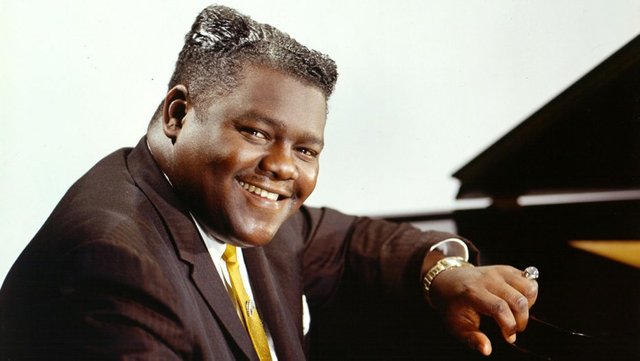Rock Pioneer Fats Domino Dies at 89
Rock and roll has lost one of its most iconic architects. Antoine "Fats" Domino passed away in New Orleans on Tuesday at the age of 89, according to CNN. The boogie-woogie piano legend brought some of his home city's signature jazz and R&B flair to the emerging genre in the early 1950s on such genre building block hits as "Ain't That a Shame," "Blueberry Hill" and "I'm Walkin'." He reportedly sold more records than any other '50s-era rockers outside of Elvis and hit Billboard pop and R&B charts from the mid-1950s through the late 1960's, notching more hits than such fellow rock godfathers as Chuck Berry, Buddy Holly and Little Richard.
Antoine Dominique Domino Jr. was born on Feb. 26, 1928, in New Orleans' Lower 9th Ward into a large musical family and began playing in local bars at age 14 after dropping out of high school, working factory jobs and hauling ice to make enough to support his musical pursuits. The portly piano-pounder received his iconic stage name in 1946 when he started sitting in with local bass player and band leader Billy Diamond. Arranger Dave Bartholomew discovered the budding star in 1949 and helped him release his first single, "The Fat Man," on Imperial Records -- his recording home until 1963. The track is credited with being the first rock record to sell over one million copies and some consider it to be the first rock single.
By 1955, Domino released the first in a string of gold and multi-platinum singles, "Ain't It a Shame," (later covered by Pat Boone as "Ain't That A Shame," a No. 1 hit on the pop charts, while Domino's peaked at No. 10) followed the next year by one of Domino's biggest hits, a cover of the 1940s Glenn Miller Orchestra track "Blueberry Hill," at No. 2 on the pop charts his highest charting hit. The hits kept coming, with such songs as "If You I Love," "Valley of Tears," "The Big Beat," "Whole Lotta Loving," "I'm Ready" and "Walking to New Orleans," which all highlighted Domino's signature Dixieland-inspired rhythmic piano playing.
Paving the way for future stars such as Elvis, Domino became a teen icon thanks to his appearance in a pair of youth-focused films, 1956's music comedy Shake, Rattle & Roll and that same year's Jayne Mansfield comedy The Girl Can't Help It. Though Domino was hugely popular and appeared on Dick Clark's American Bandstand in 1957, Biography notes that he and his band were still denied lodging and forced to use segregated facilities while touring in the 1950s.
The singer continued to crank out popular songs into the late 1950s such as "Whole Lotta Loving," "I'm Ready" and "I Want To Walk You Home," leaving Imperial in 1963 after scoring 37 top 40 hits for the label. His influence reverberated throughout the next decade as British Invasion acts including the Beatles and Rolling Stones employed some of his building blocks to make rock a global phenomenon. One of Domino's last charting singles was a 1968 cover of the Beatles' "Lady Madonna," a track that was notably influenced by his percussion piano playing. After leaving Imperial, Domino recorded albums for labels including Mercury, Warner Bros., Atlantic and Broadmoor, releasing his final major-label album, Christmas is a Special Day, in 1993.

Domino had 45 total entries on the Billboard Hot 100, following 22 on pre-Hot 100 charts before the ranking's debut on Aug. 4, 1958. (Prior to the Hot 100's inception, Billboard's presented separate pop singles charts based on sales, radio and jukebox plays.) Combining Domino's hits before and after the Hot 100's launch, he earned 11 total top 10s, beginning in 1955. He also earned 61 entries on Billboard's main R&B singles charts (before and after the 1958 creation of what is now called Hot R&B/Hip-Hop Songs), 39 of which hit the top 10. Among those, nine rose to No. 1. He first charted in 1950 with "The Fat Man," which reached No. 2.
Hi! I am a robot. I just upvoted you! I found similar content that readers might be interested in:
http://www.y103fm.com/entertainment/rock-pioneer-fats-domino-dies-at-89/